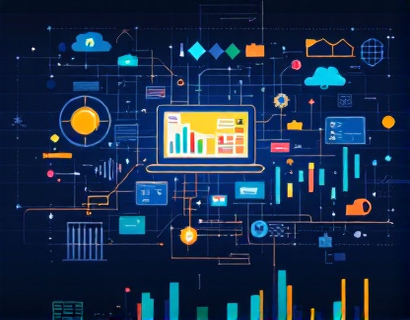Unlocking Enhanced Productivity in the Digital Age: The Synergy of AI and Cryptocurrency
The integration of Artificial Intelligence (AI) and cryptocurrency is revolutionizing the digital landscape, offering unprecedented opportunities to enhance productivity and streamline tasks. This convergence marks a new era in technological innovation, where the strengths of both domains are harnessed to create advanced solutions that redefine efficiency and user experience. As tech-savvy innovators and early adopters increasingly explore the potential of AI and cryptocurrency, it becomes essential to delve into how these technologies can be merged to unlock advanced solutions that cater to the modern digital workforce.
The foundation of this transformation lies in the unique capabilities of AI and cryptocurrency. AI, with its ability to process vast amounts of data, learn from patterns, and make intelligent decisions, provides a powerful tool for automating complex tasks and providing insights that drive productivity. Cryptocurrency, on the other hand, offers a decentralized, secure, and transparent medium for transactions, enabling new models of economic interaction and value exchange. When combined, these technologies can create a synergistic effect that amplifies their individual strengths, leading to innovative applications that enhance digital productivity.
One of the primary ways AI and cryptocurrency intersect is through the development of decentralized applications (dApps). These applications leverage blockchain technology to ensure transparency, security, and user control, while AI enhances their functionality by providing intelligent and adaptive features. For instance, AI-driven dApps can automate routine tasks, predict user needs, and optimize resource allocation, all within a trustless and secure environment. This not only improves efficiency but also builds trust among users, as the decentralized nature of blockchain reduces the risk of centralized failures or manipulations.
Another significant area where AI and cryptocurrency converge is in the realm of smart contracts. Smart contracts are self-executing contracts with the terms of the agreement directly written into code. When AI is integrated into smart contracts, it enables the creation of more sophisticated and dynamic agreements that can adapt to changing conditions and execute complex logic. For example, AI can analyze market data in real-time and automatically adjust the terms of a smart contract to optimize outcomes, ensuring that all parties benefit from the most current information available. This level of automation and intelligence significantly reduces the need for intermediaries, lowering costs and increasing the speed of transactions.
The combination of AI and cryptocurrency also opens up new possibilities in the field of data management and analytics. AI algorithms can process and analyze large datasets to uncover valuable insights, which can be particularly useful in industries that deal with vast amounts of data, such as finance, healthcare, and supply chain management. Cryptocurrency provides a secure and transparent way to store and share these insights, ensuring that data integrity is maintained and that all stakeholders have access to the same information. This transparency fosters collaboration and innovation, as organizations can build on each other's insights to develop more effective solutions.
In the context of productivity tools, the integration of AI and cryptocurrency can lead to the creation of decentralized productivity platforms. These platforms use AI to personalize the user experience, offering tailored recommendations and automating repetitive tasks. Cryptocurrency can be used as a native currency within these platforms, incentivizing users to contribute value, such as by providing high-quality content or participating in community governance. This dual approach not only enhances the functionality of productivity tools but also creates a sustainable economic model that rewards users for their contributions.
Moreover, the use of AI in cryptocurrency trading and finance is transforming the way individuals and businesses manage their digital assets. AI-driven trading bots can analyze market trends, identify opportunities, and execute trades with high precision and speed, far beyond human capabilities. This not only increases the potential for higher returns but also reduces the emotional and cognitive load on traders. Additionally, AI can enhance the security of cryptocurrency transactions by detecting and mitigating fraudulent activities in real-time, providing an additional layer of protection for users.
The educational aspect of this technological convergence cannot be overlooked. As more professionals recognize the potential of AI and cryptocurrency, there is a growing need for resources that demystify these technologies and provide practical guidance on their application. Platforms that offer AI and cryptocurrency education, coupled with hands-on projects and real-world examples, play a crucial role in empowering the next generation of tech innovators. These platforms can utilize AI to curate personalized learning paths, provide instant feedback, and connect learners with a community of peers and experts, thereby enhancing the learning experience.
In the workplace, the integration of AI and cryptocurrency can lead to more agile and responsive organizations. AI can optimize internal processes, from project management to resource allocation, ensuring that teams are always working efficiently. Cryptocurrency can facilitate seamless and secure payments within and outside the organization, eliminating the need for traditional banking systems and reducing transaction costs. This combination not only streamlines operations but also fosters a culture of innovation and adaptability, as employees are encouraged to explore and implement new technologies.
Furthermore, the environmental benefits of this technological synergy should not be ignored. Traditional financial systems and centralized data centers consume significant amounts of energy, contributing to carbon emissions. By leveraging blockchain and AI, organizations can create more energy-efficient systems. For example, AI can optimize the energy usage of blockchain networks, ensuring that they operate at peak efficiency while minimizing environmental impact. Additionally, the use of renewable energy sources to power these systems can further reduce their carbon footprint, aligning technological advancement with sustainability goals.
The future of work is increasingly digital, and the integration of AI and cryptocurrency is poised to play a pivotal role in shaping this future. As more companies adopt these technologies, we can expect to see a shift towards more autonomous, secure, and efficient work environments. The key to success in this new landscape will be the ability to embrace and effectively utilize these innovations, leveraging their unique capabilities to drive productivity and growth.
In conclusion, the merging of AI and cryptocurrency represents a transformative force in the digital age, offering a wealth of opportunities to enhance productivity and redefine how we work and interact. By understanding and harnessing the potential of these technologies, individuals and organizations can stay ahead of the curve, capitalizing on the benefits of a more intelligent, secure, and decentralized digital world.











































